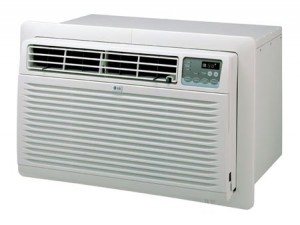From the window to the wall, to the A/C unit you bought at the mall, don’t let that sweat drip down your… face. What did you think I was going to say? Okay, so these aren’t hot lyrics, but these are hot months acomin’. Chances are you’ve already had your air conditioning running this year. If that’s the case, you might be fretting over your next electric bill. Or perhaps it’s been running for a while now, and you’ve already been slapped with sticker shock. But relief can be found, and not just from the heat, but also from the heavy price it takes to cool down.
For whole house cooling, you may already have central air, a furnace that both heats and cools your home with a refrigeration unit outside. In single level homes such as apartments for example, you ought to be able to keep your thermostat around 75 and be able to keep your home cool just fine. If 75 seems a tad warm for you, try strategically placing fans in notorious hot spots in your home. Contrary to popular belief, running one or two fans in addition to your A/C will not skyrocket your electric bill. As long as you maintain your A/C at a moderate temperature, as stated above, you will actually save money by using this method of cooling. Another helpful tip is to leave that dial alone. Often we are tempted to push up the temperature or even shut off the air completely at night. This seems smart but isn’t. It’s much less stressful on your cooling unit to continue to run through the night than it is for it to start anew after being shut off. Another way to look at it is that it’s much easier to maintain a steady cool temperature than it is to cool off an already warm house.
For homes that are more than single level, throwing in a basement or second floor or attic, cooling becomes a game of what vents to have open and which ones to close. The general rule of thumb is that heat rises. That said open only the vents that are on the top floor of your home. Since attics don’t typically have ducts in them, consider installing attic fans. Attic fans are designed to suck out heat to the outside. Then, as your air conditioning works its mojo, the cool air will filter down to the other rooms of your house.
But perhaps you’ve taken all these suggestions and your electric bill is still too high. One method of cooling that is quickly catching on is geo thermal heating and cooling, also called ground source heat pumps. The initial cost of installing such a unit is admittedly higher than traditional central air; however, within the course of three to five years, it will pay for itself and then some. These babies work by using the Earth’s natural ability to maintain a steady temperature year round underground. In the Winter, heat from underground is pumped via buried pipes into your home. Conversely, in the Summer, heat from your home is pumped outside via these pipes into the Earth. These units are highly efficient, are immune to weather, last much longer than traditional above ground units, and the long-run savings are huge. Did I mention they are eco-friendly? That’s right, there is zero pollution. Because of this, installers of ground source heat pumps can benefit from state purchase programs.
Then again, you may not have central air or the initial deposit money for a brand new home-wide system. Better yet, maybe your living space is small enough not to justify having central air. So, the next alternative becomes owning a window or portable air conditioning unit. Knowing what to buy is then a matter of understanding BTU’s. Relax; you won’t need a calculator with you as you go shopping. BTU is just a standard of measurement that relates to an air conditioner’s cooling capacity. More often than not, manufacturers have already taken the guesswork out of the equation by printing right on the box exactly how many square feet the unit is designed to cool. But on the off chance this information is missing, just know these two things. One, match together units that have high BTU and low wattage use; and two, know that window units and portable units are designed to only cool a single room of your home. If you need further breakdown, Home Depot offers a BTU calculator on their website. It’s easy to use and free. If your home is large with a multitude of rooms, singular cooling units is probably not the way to go. Still, if you must purchase one of these units, be smart about it. First, figure how many people live in your home. The more people you have, the more cooling units you’ll need. The same is true for multi-level, multi-room homes. If you have just a couple of people in your home but still require multiple rooms to be cooled, consider a portable air conditioning unit versus a window unit. Portables resemble space heaters and can be easily moved to whatever room you’re inhabiting at the time.
As I wrap this up, I leave you with just a couple more tips, ones that don’t cost a cent. On particularly hot days, avoid opening windows. We all love the fresh air, but a hot breeze is still just that… HOT. Also, keep the curtains closed. As sun filters in through the windows, we get a greenhouse effect, heating up the house. That doesn’t mean you have to live like a vampire. If you want to enjoy the sun, just step outside versus letting it into your house. Provide some extra shade and beauty to your property by planting some trees. Hope you enjoy these tips, and stay cool!
